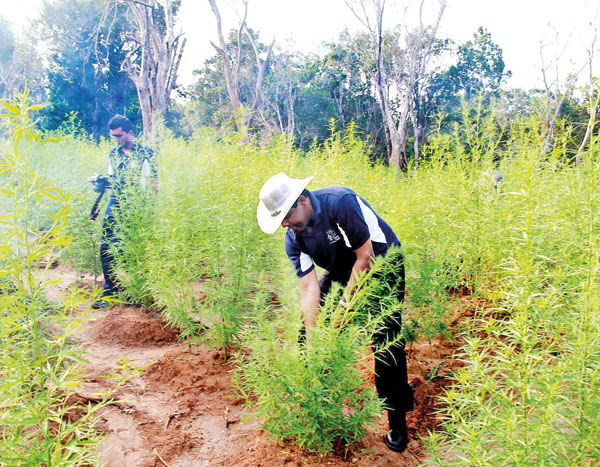News
Growing cannabis for export as medicinal products first step to legalising its recreational use, warn experts
View(s):By Wasantha Ramanayake
Legalising ‘Triloka pattra’ (cannabis) cultivation for export as medicinal and allied products would not only violate international conventions but also be a first step to legalising its recreational use, warned the chairman of the National Dangerous Drugs Control Board (NDDCB).
The NDDCB was not formally notified of the appointment of a committee to look into the cultivation of ‘Triloka pattra’ for export as medicinal and allied products, and it was passed in Parliament within a short period of time, said the Chairman, Attorney-at-Law, Shakya Nanayakkara.
The committee that included the IGP as a member was headed by the Ayurvedic Commissioner General, he said.
The NDDCB, as the legal authority, is bound by international conventions and is obliged to inform the International Narcotic Control Board (INCB) when such consignments are exported.

A cannabis plantation
Mr. Nanayakkara, objecting to the move, said that, like in other countries, it will soon become available in the local market as recreational cannabis.
“This is happening in other countries where cannabis is grown, and it has come to the street,” he said.
“How many BOI products that were only meant for export are now available in the local market,” argued Mr. Nanayakkara.
“Whatever is said in the documents, in practice, cannabis will be available on the black market,” he warned.
“Cannabis is a falling market, as there is an oversupply, as many African countries that used to export tobacco are now exporting cannabis,” the NDDCB chairman said.
Although initially cultivation is intended only for export as a medicinal product, the next step would be legalising of cannabis for recreation, such as smoking, he said.
“Countries like Thailand and Canada now want to reverse the process of legalising cannabis, especially in Thailand,” he said, pointing out the difficulty of reversing the process.
“Thailand is now faced with the challenge of reversing the process, which is much more difficult than legalising, after much harm has been done,” he cautioned.
“Tobacco was touted as a medicinal product until it was conclusively linked to causing cancer and heart diseases as far back as in the 1960s, but after prolonged denials and suppression of research, only as late as 1997 did the companies acknowledge that tobacco caused cancer and heart diseases,” he said. The use of tobacco was banned in public places across the globe following this, he added.
Mr. Nanayakkara said a similar pattern would unfold with cannabis just as tobacco was introduced into the market, and it should be stopped.
He said the harm caused by cannabis to people is far greater than that caused by tobacco or alcohol, and he pointed out that there is a separate ward at the National Institute of Mental Health in Angoda to treat cannabis addicts.
The Department of Ayurveda (DoA) does not have the human resources nor the capacity to supervise the “Triloka patthra” cultivation and production of medicinal products, pointed out Sampath de Seram, Executive Director, Alcohol and Drugs Information Centre (ADIC) Sri Lanka.
Mr. Seram said that when the police, STF, Army, and Navy together are unable to control the market being flooded by illegal drugs, how could the DoA supervise large cannabis plantations without it eventually leaking into the black market?
The law passed in parliament allowing cannabis cultivation on a commercial scale violates both international and domestic laws on drugs, Mr. De Seram said. He said the current oversupply of cannabis in the world market will not fetch expected export income but could, on the other hand, be available in the local black market in the absence of a proper preventive mechanism.
All the top global tobacco companies have invested huge amounts of money in cannabis since they see it as their future as sales of tobacco are decreasing, Mr. Seram warned, adding that they are targeting youth.
There is no evidence whatsoever to show wide use of cannabis among our ancestors, as glorified by some lobbyists of cannabis, he said.
Though pro-cannabis lobbyists claim that the use of cannabis promotes relaxation, prolonged use of it can affect a person both physically and mentally, said Dr. Kapila Ranasinghe, former President of the College of Psychiatrists.
“Especially cannabis permanently damages the brains of young people,” he warned.
People with stressful lifestyles, anxiety, or mild depression would feel better and calmer, but in the long run, the problem would become worse as they would become addicts.
Cannabis is highly addictive, and long-term use could cause anxiety, depression, and insomnia, as well as severe mental disorders such as losing touch with reality, agitation, and behaving in a bizarre manner. Existing mental illnesses could get worse with the use of cannabis,” Dr. Ranasinghe said, adding that it could also affect one’s lungs.
“Even trying out cannabis could be dangerous as it could become addictive,” warned Dr. Ranasinghe.
There is only an estimation of around one hundred thousand cannabis users in the country, and the number would definitely increase as the availability of cannabis increases, as has happened in other countries.
According to foreign media in Malawi, a sub-Saharan African country, the number of teenagers using cannabis doubled soon after Malawi legalised the use of industrial hemp, a variant of the cannabis sativa plant that contains fibre used to manufacture textiles, paper, and ropes, in 2020.
African countries, including Zambia, Zimbabwe, and Malawi, which are major tobacco exporters in Africa, are legalising cannabis as tobacco prices are falling in the world market, largely because of anti-smoking campaigns by the World Health Organization and the proven link between tobacco use and cancer.
The best way to say that you found the home of your dreams is by finding it on Hitad.lk. We have listings for apartments for sale or rent in Sri Lanka, no matter what locale you're looking for! Whether you live in Colombo, Galle, Kandy, Matara, Jaffna and more - we've got them all!

